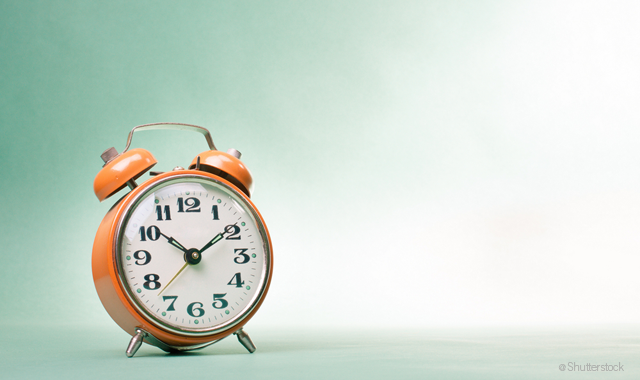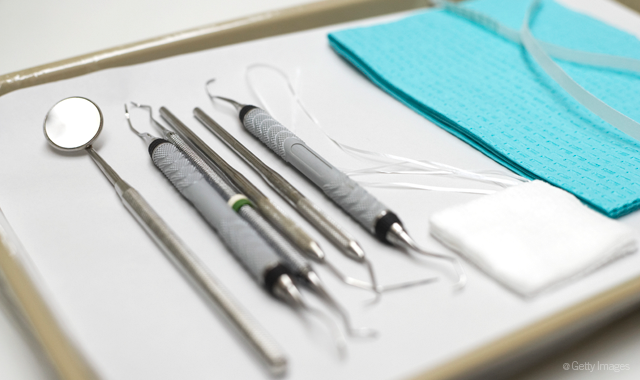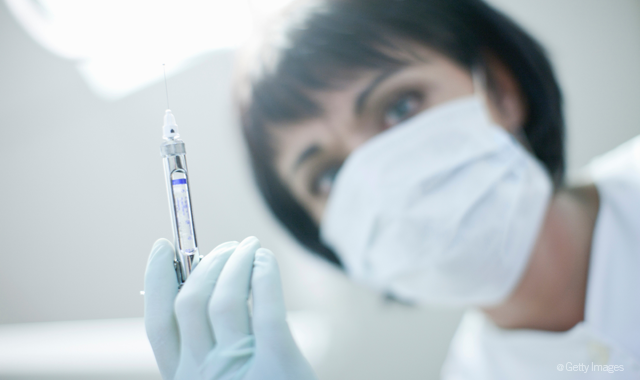5 Fascinating Questions Hygienists Asked Kara RDH in January
Kara RDH answers 5 questions you had, ranging from frustrations with dentists to advice about assisted hygiene.
As a well-known and accomplished dental hygienist, Kara Vavrosky often gets asked for advice.

She runs the popular Facebook page Dental Hygiene with Kara RDH and is also the founder of dentalhygieneanswers.com, a question-and-answer platform for dental hygienists.
Here, Vavrosky shares five more interesting questions she's been asked recently, along with her answers.
This month, readers had questions about irritating coworkers, concerns about anesthesia, worries about mistakes and more!
Click here to see more questions Kara answered!

I am in a bit of a conundrum. I am a new grad and my doctor is asking me to pick up my pace. I am often late starting appointments due to her chit chat with the patients. I was scheduled an hour and a half for SRP’s (I started 20 minutes late and had to probe), and do not feel I did a very thorough job at all. This patient has NEVER been to the dentist before and is 48 years old. What do I do?
Second question: The dentist I am working for had done all her own hygiene before hiring me and I am running into burnished calculus, a lot. I think this is due to her crappy ultrasonic. It is cordless and heats up, super-hot and super-fast. Sometimes I have to put it down because it is getting too hot for me to hold, even with the water on full blast drowning the patient. I turned the power down, and the dentist told me if I don’t have the power on full blast I will burnish calculus … go figure! I have tried different tips and I don’t have a lead foot-with the cordless one you don’t have to keep your foot on the pedal at all. I have mentioned the ultrasonic heat to her, and she says that she doesn’t notice that at all. What do I do?
First, regarding the 48-year-old patient with no previous dental visits: You have to figure this patient has missed up to 96 cleanings. That’s if the patient started seeing the dentist at age one and missed twice a year appointments. Even if you just counted visits since the patient had permanent dentition, the number of missed visits would still be up there.
While an hour and a half is a good amount of time, sometimes a patient simply needs more, especially if your doctor takes a big chunk of time talking. So don’t get down on yourself over this! Does your office schedule a tissue check after SRPs? If so, that’s the time to go back and get anything you missed. Even though we try to be 100 percent thorough, we aren’t miracle workers and we can’t always be perfect. It would also help if you had working equipment, which brings me to your second conundrum.
Hot topic: 5 infection control mistakes you may be making and not even realize
It may be worth a sit down with your doctor to explain why you can’t “pick up the pace.” You need working equipment. There’s no excuse not to have it. For the dentist, it is simply a cost of doing business. You cannot be efficient (which can cost the office money) and you aren’t doing the patient justice-not to mention the fact that going without working equipment can actually put you at risk for musculoskeletal injuries and shorten your career.
As you probably know, if the tissue heals around calculus it can lead to a perio abscess. It would not be fun explaining to a patient that faulty equipment didn’t allow you to do your job to the best of your ability. That probably wouldn’t go over too well! When talking to the dentist, describe the issue as a concern for the office so it doesn’t sound like you are just complaining.
Chit-chat and building patient rapport is great and needed, but taking 20 minutes from an SRP patient is simply not an efficient way to run a business. If you turned the tables and did this to her patients I bet it wouldn’t fly. I would also mention to her that it would be more efficient (and money saving) for the office if you could get the full appointed time with the patient, which in turn could help you pick up the pace.
Read more: The hygienist's role in building relationships
Again, don’t get down on yourself! Have a conversation with the doctor explaining your concerns. Things need to change for you to provide excellent care to your patients and for you to meet the doctor’s needs. In my eyes, without working equipment and adequate treatment time due to the doctor’s interruptions, the blame isn’t all on you for running behind.

My office is thinking of doing some assisted hygiene. What are the pros and cons of this, and do you have any tips to make things flow well?
With any type of scheduling there are pros and cons. I have seen a wide range of preferences when it comes to assisted hygiene. Some hygienists love it, while others find it less than desirable. Hygienists who find it favorable tend to have an assistant they work well with. They also don’t mind jumping from room to room, patient to patient-just to scale-and having somebody turn over the operatory for them.
Click here to learn more about assisted hygiene
They can also handle the physical toll this can take. Those who don’t care for assisted hygiene find it too taxing, both physically and mentally to do it for the long term. They can also find they don’t have the time to build patient rapport, feel they are losing their skills in taking radiographs, or don’t like that they are the primary person reviewing the patient’s medical history. The other concern is that you are seeing double the number of patients, or near to, and making the same amount wage-wise, while the office reaps the benefits of the production.
The only way you will know if assisted hygiene is for you is to try it. Personally, I’ve done it and seen up to 18 patients per day. I fall in the category of finding it less than desirable, to say the least, but that doesn’t mean you won’t love it. It comes down to what works for you. Change is never easy, but being open to new things is always worth a try!

I recently performed half-mouth SRP’s on a patient. His pocket depths were 4-8 mm. The patient presented with generalized moderate radiographic calculus.
A week after treatment, he was back in the office for an emergency exam. Turns out, he developed an abscess on the distal of #18 where there was a 7 mm pocket from both the buccal and lingual. Of course, being the over-analytical worry-wart that I am, I couldn’t help but ask what was wrong with my patient. When I asked my boss at the end of the day, she pulled up the PA that was taken the day or the emergency exam and showed me that there was a piece of residual calculus. She explained that the tissue healed around the calculus and formed an abscess.
Totally embarrassing. I’m feeling really defeated, and horrible that I caused a patient so much pain. I’m worried this patient will never want to see me again. Have you ever experienced this before? Why do some patients develop perio abscesses and some don’t?
Don’t feel defeated! Once pockets become over 6 mm there’s only so much we can adequately reach with our instruments. In my opinion, this patient should have been referred to a periodontist. It’s not your fault if the doctor refused to refer appropriately. While you may feel horrible, remember that you did not give this patient periodontitis, you were trying to help them.
Related article: New CDC study finds high periodontal disease prevalence in Southern U.S. States
Personally, I’ve never had this happen because the doctors I’ve worked for refer when necessary. You may need to have a conversation with your doctor about developing a referral protocol. Again, don’t feel bad, even though that’s so much easier said than done! Try to take this as a learning experience. Hopefully this will show your doctor the need to refer when appropriate, and will help provide better patient care in the future.
Also, how a patient responds to residual calculus is based on so many factors. They may have a strong immune system, different pH in the mouth or any number of reasons. With healthcare, including dentistry, there is no "cookie cutter" pattern. It's not necessarily "wrong" if you want to try non-surgical periodontal therapy/SRP before referring out, but again, it’s a risk because our instruments can reach only so far. In my opinion, if doctors don't refer it is neglect. Not referring out when necessary is not only putting the doctor’s license on the line, but yours too. It is something that needs to be addressed. I find it’s best to work for a doctor that shares the same patient care standard that you do.
Trending: New gingivitis code helps you provide ethical care
Again, don’t be embarrassed or defeated. You did the best you could do under the circumstances. You and your doctor need to get on the same page when it comes to referring patients.

My dentist is awesome, but her husband-who runs the front desk and has no dental experience at all-continues to tell us what to do with infection control and how to treat patients … I’ve tried talking to my dentist, but it causes a fight between them and then everything gets super uncomfortable. Any suggestions?
On our last classroom day when I was in hygiene school, we had a good conversation about random things that us students needed to know in the “real world” that weren’t necessarily in the curriculum. One of the topics was working at an office that employed family members. What I took away from the conversation was to try not to put yourself in that situation.
Related article: 4 myths about dealing with conflict in the dental practice
I will admit that I didn’t take this advice and have been in your exact situation. If the dentist wants to employ a family member who brings drama into the office, they must live with that. However, you have a choice not to take part. However, this is almost impossible, as dynamics of the office affect everyone as a team.
If bringing up legitimate issues about the front desk to your boss causes fights between the two, so be it. Again, the doctor made the choice to employ her husband. You must do what you need to do to provide the best patient care.
In my opinion, someone with no experience in dentistry should not be giving infection control advice. Does your office do the required yearly OSHA training? I would highly recommend training with the “front desk” sitting in.
However, training of the front desk may not completely solve the problem. It might make him feel like more of a know-it-all. If that is the case, and things don’t get better, it may be time to move on. This kind of conflict can drain your energy before you even start your day, and that’s not fair to you or your patients. I know it’s difficult to find a new job, but in the long run you will be so much happier.

Can I perform full mouth SRP with anesthesia in a day? Will it be okay with the patient?
Some hygienists prefer to do full mouth anesthesia and complete SRP in one day. Personally, I’m not one of those hygienists. Dr. Stanley Malamed (who literally wrote the book on local anesthesia) doesn’t recommend it either.
Research has shown the difference in healing rates aren’t clinically significant, when comparing healing after one or multiple sessions. When administering local anesthesia, one must remember the maximum recommended dose (MRD); because when anesthetizing the entire mouth, a lot of anesthetic is used. This is especially important for medically compromised patients.
Furthermore, anesthetizing the whole mandible has risks to the patient. There is greater risk of the patient injuring themselves by biting their tongue and buccal mucosa. On these same lines, patients feel “swollen” when anesthetized and patients can panic because they feel like they can’t breathe or swallow. This is only my opinion, based on Dr. Stanley Malamed’s recommendations, and some hygienists don’t share my opinion.
Related article: 14 questions patients ask in their periodontal consultation you need to answer
I also prefer to do no more than two quads at one time. For instance, upper right and lower right then upper left and lower left. This method lowers the risks mentioned above. It also gives me the chance to assess and review homecare over multiple appointments. Additionally, it ensures the patient isn’t in the chair for an excessive amount of time. If a patient would prefer to have it all done at once, and their insurance will cover it (some won’t), then that is up to the patient. As long as the risks are explained, whether it’s okay with them can only be decided by the patient.